ATHLETICS
Winningest Cornell coach knows how to horse around
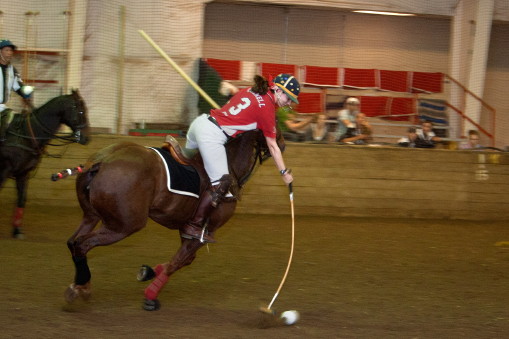
Lizzie Wisner '11, women's polo team captain, during postseason play at Cornell's Oxley Equestrian Center.
What coach has the most wins in Cornell athletics history?
Could it be men's lacrosse coach Richie Moran or baseball's Ted Thoren, who each led their respective teams for 29 successful years?
Maybe it's Andrea Dutcher, who served 14 years as volleyball coach and had the Ivy League trophy named for her.
Perhaps it's current head coach Mike Schafer (men's ice hockey) or Dick Blood (softball), leading the Big Red for 16 and 15 years, respectively, and having great success along the way.
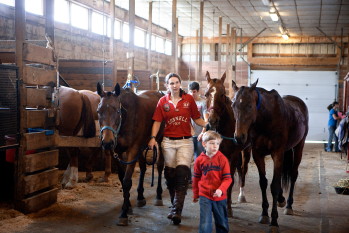
Wisner leads horses out of the barn before a match. See larger image
Wrong.
The answer is David Eldredge '81, who coaches men's and women's polo, a sport that is little known outside of the Cornell Department of Athletics.
But Eldredge and his Big Red polo teams continue to chalk up tremendous successes.
The Cornell women's polo team cruised through the season (which runs from October through April), going undefeated en route to its third straight (19th overall) Northeast Regional title. The top-seeded Big Red advanced to the USPA National Intercollegiate Championships where it first defeated Texas A&M before downing Virginia to win the program's 13th national championship.
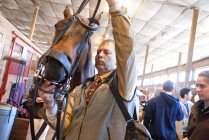
Coach David Eldredge '81. See larger image
The men were also successful, finishing the season with a 15-5 record overall. The squad captured its ninth consecutive Northeast Regional crown, its 18th title overall, and advanced to the USPA National Intercollegiate Championships where it fell to the Cavaliers in the championship game.
Eldredge – officially, the Peter B. Orthwein '69 Head Coach of Polo - is nearing the 800-win plateau with a record of 785-267-25 (.740). He has 243 more wins than second-place Blood (542). Thoren (541 wins) comes in third, ahead of Dutcher (346), Schafer (313) and Moran (257).
An agricultural engineering major as a Cornell student, Eldredge captained the polo squad for three years, leading the Big Red into the national championships four times and thrice finishing as national runner-up. He has since become a legendary collegiate coach, guiding his teams to a combined 12 national titles and 32 national championship appearances.
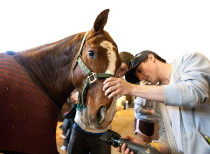
Max Constant '11, men's polo team captain, grooms a horse before a match. See larger image
For Eldredge, polo is a family affair. His father, Halsey Eldredge '44, learned to play as part of the Cornell ROTC program and brought the game back to the family farm in Sharon Springs, N.Y. Eldredge and his brother Charles '77 learned the game as children, and Charles preceded David as captain of the Cornell team, 1973-77.
Wife Karen '90 also played polo and now serves as an assistant coach, so it seems only natural that the couple's daughter Kailey '14 is on the 2010-11 squad, and 15-year-old daughter Emma hopes to attend, and play for, Cornell.
Polo is a sport that Eldredge describes as "a little like hockey on horseback" and claims that because of the fast action, it is addicting for players and fans.
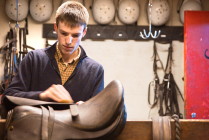
Alexander Thomson '14 cleans a saddle. See larger image
Each team, playing on what is essentially an enclosed football field, consists of three players on horseback carrying long-handled mallets. The players attempt to drive a ball into the opposing goal. There is no goalie – and, yes, occasionally a goal does get credited to a horse.
In away games, the host squad provides the horses with riders being assigned by a coin flip prior to the match.
Eldredge is quick to point out that the rules of the game are designed to safeguard the horses. A match consists of four chukkers – a seven-and-a-half-minute period – with two four-minute breaks, additional timeouts specifically for the horses and a 15-minute halftime. Each horse participates in just one chukker for each team, playing a maximum of 15 minutes and getting minimum rest of about 26 minutes per game.
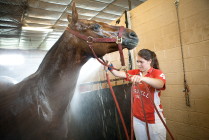
Ali Hoffman '12 washes down a horse after a match. See larger image
"If you take care of the horses, you're going to take care of the players," Eldredge explains.
"One of the philosophies I got from my father is that this is just a game … Any good coach wants to win, but at the same time, I've kept it in mind that I want the athletes to have a good time."